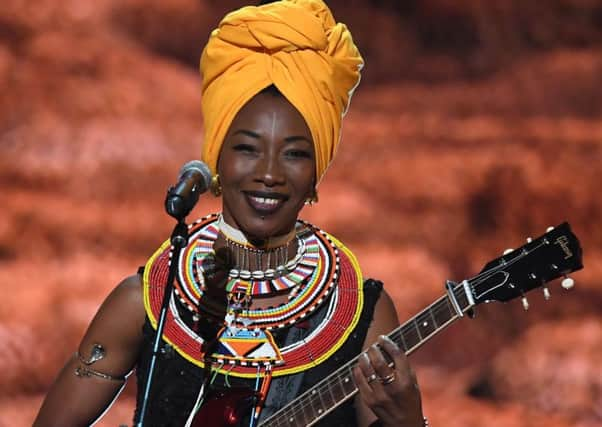Celtic Connections reviews: Fatoumata Diawara | Frigg | Sky and Lammermuir


Fatoumata Diawara, Tramway, Glasgow ****
In the same week as Celtic Connections’ director Donald Shaw stated his intention to try to curtail the carbon footprint of a festival whose eclectic international component is an integral part of its success, a show took place in the Southside’s ever-atmospheric Tramway which demonstrated precisely why creative solutions to sustainable travel across the music industry will ultimately be far more welcome than complete abstinence.
Born in Ivory Coast, raised in her parents’ home country of Mali and now based in Paris, Diawara – also a prolific screen actor – has recorded with Bobby Womack, Herbie Hancock and the British dance music duo Disclosure, as well as taking part in Damon Albarn’s Africa Express project. Although the sometime Blur singer didn’t repeat the guest appearance he made at Diawara’s London Roundhouse show last week, his presence wasn’t required to smooth a communion between the singer and her eager audience.
Advertisement
Hide AdAdvertisement
Hide AdBacked by a smart, white-suited four-piece group, Diawara performs music which picks from Malian influences as well as elements of jazz and conventional Western rock to support her personal vibrancy as the kind of artist who might be described as a force of nature. Dedicating the song to all the women artists “still fighting to be leaders… in our crazy world”, for example, and invoking Angelique Kidjo and Nina Simone in her introduction, Diawara adapted the latter’s Sinnerman into a rich afrofunk groove, spinning with her hair unleashed and fist pumped defiantly in the air as the song built in intensity.
From her 2018 album Fenfo (‘Something to Say’), songs included the rich, dramatic acousticism of Don Do, Nterini’s evocation of a young migrant’s journey – reflecting Diawara’s own foregrounded political concerns – and the main set finale, her own occasional guitar-playing complementing that of lead guitarist Yacouba Kone. By the end she had pulled a couple of dozen eager dancers onstage from the audience and was leading the whole hall in a dance of synchronised arm-swinging, a suitably heart-warming finale to a show by an impressive, elemental artist. David Pollock
Frigg, City Halls, Glasgow ****
The powerful fiddle band Frigg, celebrating their 20th birthday and tenth album, are rooted in Finland’s fiddle heartland of Kaustinen but embrace strands of Scandi-pop, Balkan music and bluegrass – “Nordgrass”, as they say. And if their introductory set morphed from sighing fiddle harmonies into a reel that seemed to fudge the Scots-Nordic cultural divide – well, it was indeed composed by Shetland fiddler Chris Stout.
With four fiddles up front, backed by double bass, guitar and cittern, the septet could shift between hauntingly simple melodies, ethereal interludes and big, wordless vocal choruses, sometimes within a single tune, as in Keidas – “Oasis”.
Stately polskas took on a near-orchestral energy with dramatic upward slides, while an eastern European dance excursion shrilled gleefully. In contrast, the four fiddlers were left unaccompanied for a dreamy pastoral that turned out to be by the English singer-songwriter Chris Wood. Opening the show, the Glasgow-based Anglo-Scots-Irish-Manx quintet Ímar also packed plenty of punch but could have done with changing down a gear or two from time to time.
Led by fiddle, uilleann pipes and concertina, there was no doubting their virtuosity, but their consistently hell-for-leather attack, sometimes with ridiculous levels of bass boom, threw timbre and nuance out the window, although an enthusiastic audience would doubtless disagree. There was an inventively adroit bodhran solo from percussionist Adam Rhodes, while their final set opened with a fine, keening, Irish-sounding air before, inevitably, it was pedal-to-the-metal all the way home. Jim Gilchrist
Sky and Lammermuir, Glasgow Royal Concert Hall ***
It’s wonderful to see our national orchestras let their hair down and get stuck into the mixed genre spirit of Celtic Connections, but the success of that depends largely on the music placed in front of them. This pairing of Phamie Gow’s musical travelogue Lammermuir (the subject of her 2001 second album) with American fusionist Michael Torke’s violin concerto Sky highlighted that point.
Advertisement
Hide AdAdvertisement
Hide AdThe orchestra was the splendid RSNO, just back from a criss-cross European tour, who clearly found the action- packed bluegrass-meets-rocket-fuelled-minimalism of Torke’s concerto and the thigh-slapping energy of soloist Tessa Lark’s infectious pizzazz a far more satisfying ride than the modal repetitiveness defining the low-energy moments of Gow’s orchestral backwash.
The focus of Gow’s sequence was the undulating charm of its individual numbers and frontline personalities, not so much its overall cohesion. That seemed its sole purpose: a lilting fiddle number from Alasdair Fraser, the cool breezy lyricism of Jarlath Henderson on uilleann pipes, the breathy voice of Mairi Campbell matched by her brief switch to mellow viola and Gow herself, opening the sequence on harp and guiding the crescendoing finale – The Night Fold – from the piano.
Torke’s Sky was a blast for the entire ensemble, Lark’s foot-stomping opening like an incendiary wake-up call to conductor Teddy Abrams and the RSNO, whose hot-blooded rhythmic interaction lit up every seething moment. There were gorgeous sultry moments, too, in a work that gave everyone on stage the opportunity to shine. Ken Walton